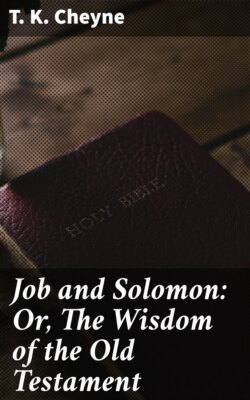Читать книгу Job and Solomon: Or, The Wisdom of the Old Testament - T. K. Cheyne - Страница 7
На сайте Литреса книга снята с продажи.
CHAPTER II.
THE SECOND CYCLE OF SPEECHES.
(CHAPS. XV.-XXI.)
ОглавлениеTable of Contents
The three narrow-minded but well-meaning friends have exhausted their arsenal of arguments. Each with his own favourite receipt has tried to cure Job of his miserable illusion, and failed. Now begins a new cycle of speeches, in which our sympathy is still more with Job than before. His replies to the three friends ought to have shown them the incompleteness of their argument and the necessity of discovering some way of reconciling the elements of truth on both sides. They can teach him nothing, but the facts of spiritual experience which he has expounded ought to have taught them much. But all that they have learned is the impossibility of bringing Job to self-humiliation by dwelling upon the Divine attributes. No doubt their excuse lies in the irreverence of their friend’s manner and expressions. It is a part of the tragedy of Job that the advice which was meant for practical sympathy only resulted in separating Job for a time both from God and from his friends. The narrow views of the latter drove Job to irreverence, and his irreverence deprived him of the lingering respect of his friends and seemed to himself at times to cut off the slender chance of a reconciliation with God. From this point onwards the friends cease to offer their supposed ‘Divine consolations’ (xv. 11)—such as the gracious purpose of God’s ways and the corrective object of affliction (v. 8-27)—and content themselves with frightening Job by lurid pictures of the wicked man’s fate, leading up, in the third cycle of speeches, to a direct accusation of Job as a wicked man himself. And yet, strange to say, as the tone of the friends becomes harsher and more cutting, Job meets their vituperation with growing calmness and dignity. Disappointed in his friends, he clings with convulsive energy to that never quite surrendered postulate of his consciousness a God who owns the moral claims of a creature on the Creator. Remarkable indeed is the first distinct expression of this faith of the heart, of which an antiquated orthodoxy sought to deprive him. He has just listened to the personalities, the cruel assumptions, and the shallow commonplaces of Eliphaz (who treats Job as an arrogant pretender and a self-convicted blaspheming sinner), and with a few words of utter contempt he turns his back on his ‘tormenting[27] comforters’ (xvi. 2). (Soon, however, he will appeal to them for sympathy; so strong is human nature! See xix. 21.) Left to his own melancholy thoughts, he repeats the sad details of his misery and of God’s hostility (and again we feel that the poet thinks of suffering humanity in general[28]), and reasserts his innocence in language afterwards used of the suffering Servant of Jehovah (xvi. 17; comp. Isaiah liii. 9). Then in the highest excitement he demands vengeance for his blood. But who is the avenger of blood but God (xix. 25; comp. Ps. ix. 12)—the very Foe who is bringing him to death? And hence the strange but welcome thought that behind the God of pitiless force and undiscriminating severity there must be a God who recognises and returns the love of His servants, or, in the fine words of the Korán, ‘that there is no refuge from God but unto Him.’[29] ‘Even now,’ as he lies on the rubbish-heap—
